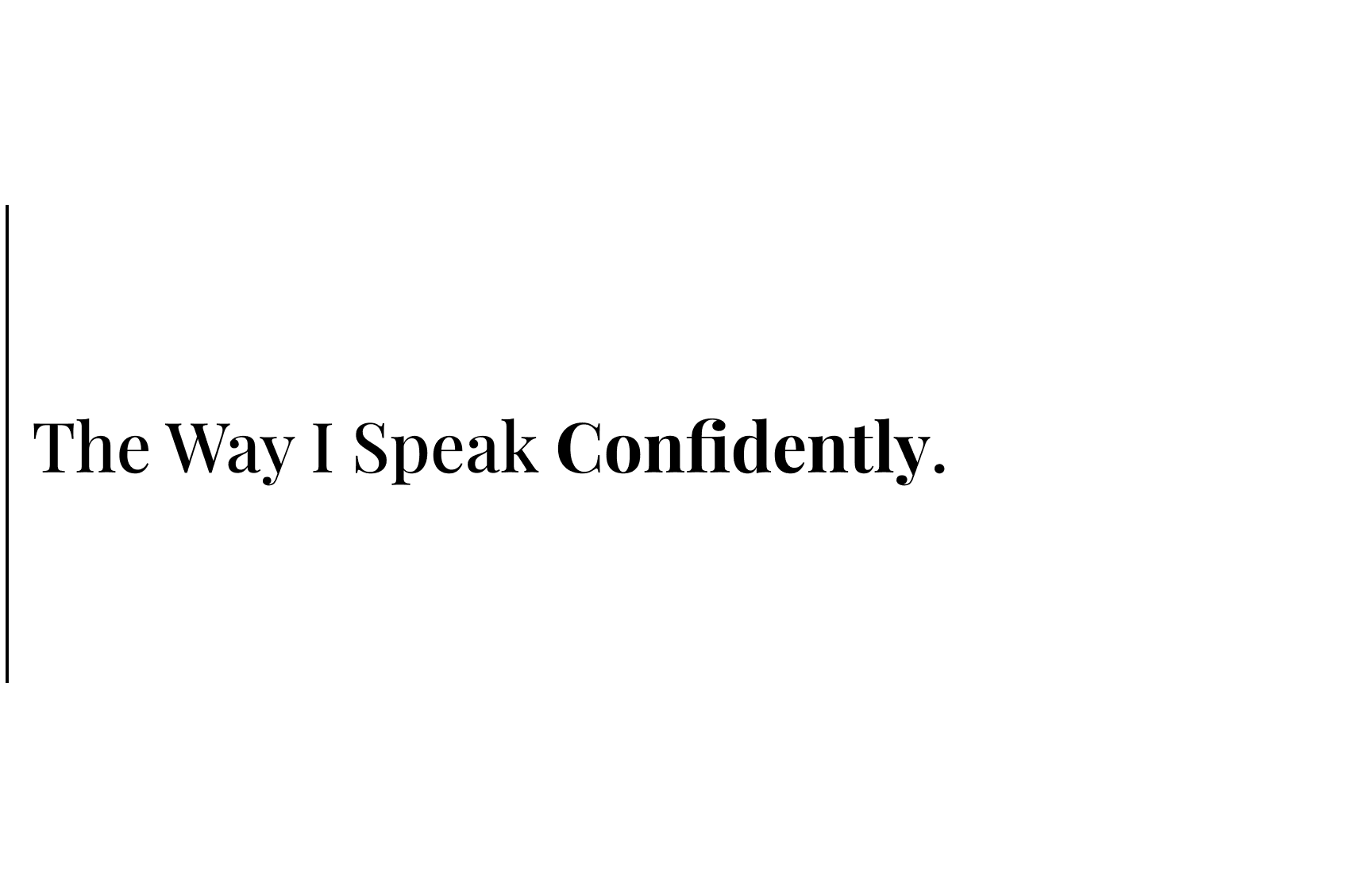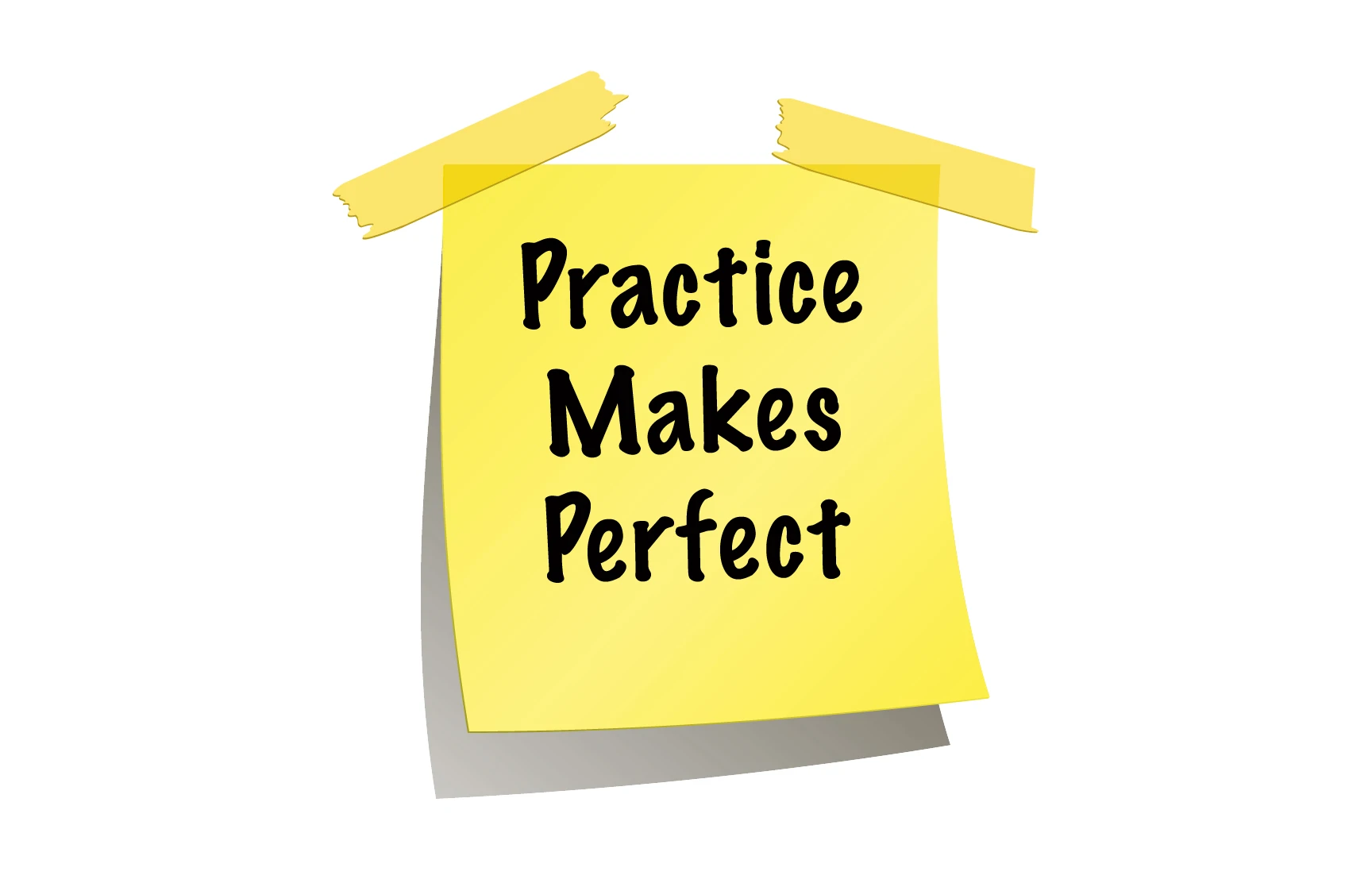
It is a journey to overcome fear, build clarity, and speak boldly to master the art of confident communication.
The following ten actions will help you develop your confidence in speaking:
- Understand Your Why
- Practice Deep Breathing
- Record Yourself Speaking
- Expand Your Vocabulary
- Speak Slowly and Clearly
- Use Positive Body Language
- Start with Small Conversations
- Join a Public Speaking Group
- Handle Mistakes Gracefully
- Prepare and Practice
Understand Your Why

Understanding Your "Why" for Improved Speaking Skills
Why is it important to know your "why"?
When you're clear about your motivation for improving your speaking skills, staying committed and focused on your goals becomes easier. Here's why:
- Direction and Concentration: Having a clear understanding of your "why" gives your practice direction. Are you trying to get better at public speaking for presentations at work, conversational skills for social situations, or storytelling for personal development? Various tactics and workouts are needed for each aim.
- Motivation and Persistence: Overcoming obstacles and maintaining motivation are made simpler when you have a strong connection to your "why." Your determination can be strengthened by the knowledge that having better public speaking abilities can positively impact your general well-being, personal connections, and professional success.
- Personalized Practice: Understanding your "why" enables you tailor your exercise for your particular needs. If your aim is to enhance your conversational skills, you would possibly consciousness on lively listening, asking open-ended questions, and sharing non-public anecdotes. For public speaking, you would possibly prioritize frame language, voice modulation, and structuring your speech effectively.
How to identify your "why":
- Reflect on your goals: Consider your career aspirations, personal relationships, and overall life goals. How can improved speaking skills contribute to these areas?
- Imagine the benefits: Visualize the positive outcomes that will result from your improved speaking skills. Will you feel more confident in social situations? Will you be able to express your ideas more effectively at work?
- Connect in your values: Think approximately your middle values and the way stepped forward talking competencies align with them. For example, if honesty and authenticity are vital to you, powerful communique allow you to explicit your self truly and connect to others on a deeper level.
When you know "why," you'll be more prepared to go out with purpose and tenacity to enhance your speaking abilities.
Practice Deep Breathing

The Power of Deep Breathing for Improved Speaking
Deep breathing is a simple yet effective technique that can significantly enhance your speaking skills. Here's why:
- Minimizes Anxiety: Stress and anxiety are frequently brought on by shallow breathing, which is a common sign of nervousness. Breathing deeply can assist to relax your body and mind by regulating your neurological system.
- Improves Voice Quality: Deep breathing causes your lungs to fill completely, giving your voice chords enough oxygen. Your voice will sound better as a result, with more resonance and projection.
- Improves Enunciation: Deep breaths allow you to control the pace and volume of your speech, ensuring clear enunciation and preventing rushing or mumbling.
- Increases Confidence: As you become more comfortable with deep breathing, you'll feel more confident and in control of your speaking abilities.
This is a simple deep breathing exercise that can be practiced:
- Find a comfortable position: Sit or stand upright with your feet shoulder-width apart.
- Place your hands on your abdomen: This will help you feel the rise and fall of your diaphragm.
- Inhale deeply: Breathe in slowly through your nose, allowing your abdomen to expand.
- Hold: Hold your breath for a few seconds.
- Exhale slowly: Breathe out slowly through your mouth, feeling your abdomen contract.
- Repeat: Repeat this cycle for several minutes.
Additional tips for effective deep breathing:
- on your breathing: Take note of how your breath feels as it enters and leaves your body.
- Imagine yourself at ease: Breathe and picture yourself in a serene and tranquil environment.
- Incorporate deep breathing into your speaking practice: Practice deep breathing before, during, and after your speaking engagements.
Incorporating deep breathing exercises into your speaking regimen will help you feel less nervous, sound better, and project more confidence when you speak.
Record Yourself Speaking
Recording yourself is a valuable tool for analyzing your speaking skills and identifying areas for improvement. Here's why:
- Objective Feedback: Although hearing your own voice could be unsettling, it offers an unbiased assessment of your speaking manner. You can see instances where your enunciation is imprecise, your speed is too quick or sluggish, or your tone is too monotonous.
- Finding Your Strengths and shortcomings: You may identify your strengths and shortcomings by self-recording. For instance, you may find that, although you have trouble keeping eye contact, you're really skilled at engrossing your audience in stories.
- Progress tracking: By routinely recording oneself, you may monitor your development over time. As you put new ideas into practice, you'll be able to hear yourself getting better at speaking with confidence and impact.
- Building Confidence: Listening to yourself improve can boost your confidence and motivation. Seeing the positive changes in your speaking style can encourage you to continue practicing and striving for excellence.
Tips for effective self-recording:
- Choose a quiet environment: A quiet room will make sure that your voice is apparent and unfastened from distractions.
- Use a great recording device: A cellphone or pc microphone is normally sufficient, however for greater professional-great recordings, remember the use of a committed microphone.
- Practice regularly: Record yourself regularly to screen your development and pick out regions for improvement.
- Be objective: Listen to your recordings with open thoughts and be inclined to well know each of your strengths and weaknesses.
- Seek feedback: Share your recordings with trusted friends, family, or colleagues to get their honest feedback.
Expand Your Vocabulary

Expanding Your Vocabulary: The Key to Effective Communication
A rich vocabulary is essential for effective communication. It allows you to express yourself with precision, clarity, and nuance. Here's how to expand your vocabulary:
- Read broadly: Explore a range of writers and genres. Examine literary works in the categories of poetry, fiction, and non-fiction. Take note of the author's word choices and how they affect the meaning as a whole.
- Take Part in a Variety of Topics: Explore diverse themes that interest you. This can involve current affairs, science, philosophy, or history. You will come across additional terms as you study more about different subjects.
- Maintain a Vocabulary Diary: Jot down new terms you come across in a diary. Provide the word's meaning, its usage in a sentence, and its part of speech. By doing this, you'll be able to consolidate your knowledge and incorporate the terms into your everyday lexicon.
- Utilize Novel Words in Conversations: Don't be scared to include novel words into your discourse. This will enable you to integrate them into your vocabulary naturally and strengthen your comprehension of them.
- Play Word Games: Crossword puzzles, Scrabble, and other word games can be fun ways to expand your vocabulary and improve your spelling.
- Use a Thesaurus: When you're struggling to find the right word, consult a thesaurus. This will help you discover synonyms and antonyms that can enhance your expression.
- Take Online Courses or Join a Book Club: Participating in online courses or joining a book club can expose you to new words and ideas. Discussing books with others can also help you learn new vocabulary and improve your communication skills.
Remember, expanding your vocabulary is a gradual process. Don't get discouraged if you don't see immediate results. The more you practice, the more confident you'll become in your ability to express yourself effectively.
Speak Slowly and Clearly
The Power of Speaking Slowly and Clearly
Speaking slowly and clearly is a fundamental skill that can significantly enhance your communication abilities. Here's why:
- Improved Comprehension: When you speak slowly, your audience has more time to process your words and understand your message. This reduces the likelihood of misunderstandings and ensures that your ideas are received clearly.
- Enhanced Confidence: Speaking slowly can help you feel more confident and in control. It gives you time to gather your thoughts and deliver your message with conviction.
- Increased Credibility: When you speak slowly and clearly, you come across as more knowledgeable and articulate. This can enhance your credibility and influence.
- Improved Pronunciation: Speaking slowly allows you to focus on pronouncing each word correctly, improving your overall pronunciation and diction.
- Reduced Anxiety: Speaking slowly can help reduce anxiety by giving you more time to think and respond. This can lead to a more relaxed and natural delivery.
To speak slowly and clearly, here are some tips:
- Practice Deep Breathing: Deep respiration enables to calm your nerves and sluggish down your speech.
- Consciously Slow Down: Make a aware attempt to talk extra slowly than your herbal pace.
- Pause Between Sentences: Pauses can assist to emphasise key factors and provide your target target market time to soak up your message.
- Enunciate Clearly: Pronounce every syllable of every phrase definitely and distinctly.
- Avoid Mumbling: Speak up and assignment your voice to make sure which you are heard definitely.
- Practice Regularly: The more you practice speaking slowly and clearly, the more natural it will become.
Additional exercises to improve your speaking clarity:
- Read Aloud: Read passages from books or articles out loud, that specialize in announcing every phrase absolutely and slowly.
- Recite Poems: Reciting poems permits you to enhance your articulation and pronunciation.
- Record Yourself: Record yourself talking and concentrate for regions in which you want to enhance your readability and enunciation.
- Seek Feedback: Ask pals or your own circle of relatives individuals to offer comments on your talking readability.
You may boost your impact, boost your confidence, and develop better communication skills by practicing speaking properly and slowly. Never forget that it's preferable to communicate properly and slowly than to speak quickly and cause misunderstandings.
Use Positive Body Language

The Power of Positive Body Language
Your body language plays a crucial role in how you're perceived by others and even how you feel yourself. Here's why it's important to use positive body language:
- Reflects Confidence: You may convey authority and confidence by adopting hand motions, standing erect, and maintaining eye contact. Taking up these positions might boost your confidence even if you don't feel totally secure.
- Increases Engagement: You may establish a connection with your audience and maintain their interest by using positive body language. You may communicate that you're interested in communicating with others by using open movements and maintaining eye contact.
- Confirms What You've Said: You may support the point you're making with your body language. An open hand gesture, for instance, might convey sincerity and honesty.
- Improves Your Mood: Positive body language can have a positive impact on your mood. Standing tall and maintaining eye contact can boost your self-esteem and reduce anxiety.
Here are a few guidelines on how to use positive body language:
- Stand Tall: Stand up instantly together along with your shoulders returned and your ft shoulder-width apart. This posture initiatives self-belief and authority.
- Make Eye Contact: Look at your target target market at once withinside the eye. This suggests that you`re engaged and interested by what they ought to say.
- Use Open Gestures: Avoid crossing your hands or legs, as this will seem closed off. Instead, use open gestures to signify that you are receptive and welcoming.
- Smile: A smile can make you appear more approachable and friendly.
- Mirror Your Audience: Pay attention to your audience's body language and try to mirror it. This can help you build rapport and create a sense of connection.
Remember, frame language is a effective device that will let you speak extra correctly and confidently. By practising effective frame language, you could enhance your interactions with others and beautify your normal well-being.
Start with Small Conversations
Starting Small: Building Confidence in ConversationsStarting
If you're feeling nervous about speaking in public or in formal settings, it's often helpful to start small and gradually build your confidence. Engaging in casual conversations with friends, family, or colleagues can be a great way to practice your communication skills and become more comfortable expressing yourself.
Here are a few guidelines for beginning small and constructing your confidence:
- Start with Familiar Faces: To get started, practice having conversations with people you are at ease and familiar with. By doing this, you'll be able to unwind and concentrate on the discussion without worrying about coming across as well.
- Pose Inquiry-Based Questions: You may maintain the flow of the conversation by asking open-ended questions. Steer clear of yes/no inquiries that might go you nowhere.
- Actively Listen: Ask follow-up questions and listen intently to people to demonstrate that you genuinely care about what they have to say. You'll be able to establish rapport and have a more interesting discussion as a result.
- Practice Thought Sharing: Don't be shy about expressing your personal ideas and viewpoints. Speaking out about your ideas, even if you're not convinced about them, may boost your self-assurance and communication abilities.
- Join a Conversation Group: Consider joining a conversation group or a club where you can practice your speaking skills in a supportive environment.
- Set Small Goals: Set achievable goals for yourself, such as speaking up in a meeting or initiating a conversation with a stranger. As you achieve these goals, your confidence will grow.
- Focus on the Positive: Don't dwell on any mistakes or awkward moments. Instead, focus on the positive aspects of your conversations and celebrate your successes.
Remember, building confidence takes time and practice. By starting small and gradually challenging yourself, you can develop the skills and confidence you need to communicate effectively in any situation.
Join a Public Speaking Group

Joining a Public Speaking Group: A Supportive Environment for Growth
Joining a public speaking group can be a transformative experience, providing a supportive environment where you can practice your skills and receive constructive feedback. Here's why it's a valuable step in your journey:
- Organized Practice: With many opportunities for presentations and feedback, public speaking organizations frequently follow an organized schedule. This gives you a reliable foundation for honing your abilities.
- Community of Support: People that participate in public speaking organizations are usually encouraging and supportive. They are there to provide support and guidance and are aware of the difficulties associated with public speaking.
- Constructive input: You may find areas for growth and create methods for overcoming obstacles by getting input from peers and seasoned mentors.
- Variety of themes: You may experiment with different approaches and substance by speaking on a range of themes that are offered by public speaking clubs.
- Opportunities for Networking: Associating with a public speaking organization might offer chances to meet others who share your interests.
- Developing Confidence: Your confidence as a speaker will increase as you get more experience and hear favorable comments.
Here are a few famous public speakme groups:
- Toastmasters International: Is a worldwide organization with clubs in several nations that provides a structured program for honing leadership and public speaking abilities.
- Dale Carnegie Courses: The development of interpersonal, leadership, and communication skills—including public speaking—are the main objectives of these courses.
- Local Community Colleges: A lot of community colleges provide groups and courses in public speaking.
- Online groups: You may meet other speakers and hone your public speaking talents by participating in online groups and forums.
When deciding on a public speakme group, don't forget elements inclusive of location, cost, and the group`s focus. It's additionally vital to experience snug and supported through the contributors of the group. By becoming a member of a public speakme group, you could create a high quality and supportive surroundings in your boom as a speaker.
Handle Mistakes Gracefully

Handling Mistakes Gracefully: A Key to Confidence
Mistakes are a natural part of the learning process. Even the most experienced speakers make them. The key to becoming a confident speaker is not to avoid mistakes altogether, but to learn how to handle them gracefully.
Here's how:
- Acknowledge and Correct: If you realize you've made a mistake, acknowledge it briefly and correct yourself if necessary. This shows your audience that you're aware of your error and that you're committed to accuracy.
- Don't Dwell on It: Once you've acknowledged the mistake, move on. Don't let it derail your entire speech. Focus on continuing your presentation confidently.
- Learn from the Experience: Use mistakes as opportunities for growth. Reflect on what went wrong and consider how you can avoid similar errors in the future.
- Maintain Your Composure: It's important to remain calm and collected even when mistakes occur. Panicking will only make the situation worse.
- Practice mindfulness: When things don't go as planned, mindfulness skills can help you stay focused and in the moment.
- Get Ready for Anything Unexpected: Prepare for possible errors and know how you'll respond to them. You'll feel more prepared and certain as a result of this.
- Concentrate on Your Message: Keep in mind that your message is what matters most. If you remain committed to presenting your material clearly, a small error won't take away from the overall impact of your presentation.
By studying to deal with errors gracefully, you`ll turn out to be a extra assured and resilient speaker. Remember, everybody makes errors. It's the way you reply to them that genuinely matters.
Prepare and Practice

Preparation and Practice: The Cornerstones of Confidence
Preparation and practice are essential for effective communication and building confidence. Whether you're giving a formal presentation or engaging in casual conversation, knowing your material and rehearsing can significantly improve your performance.
This is the reason practice and preparation are crucial:
- Reduces Anxiety: When you`re well-prepared, you are much less probable to experience tense or overwhelmed. Knowing your cloth and having a clean shape in your mind will let you experience extra assured and in control.
- Enhances Clarity: Preparation permits you to arrange your mind and gift your thoughts in a clean and concise manner. This facilitates your target target market recognize your message extra easily.
- Boosts Confidence: The extra you practice, the extra snug you may end up together along with your cloth. This can cause expanded self assurance and a extra herbal delivery.
- Enhances Delivery: With practice, you may pinpoint your weak points in body language, tone, and tempo, for example. You may improve your speech and leave a more lasting impression by practicing.
- Assists in Managing Unexpected Events: Being well-prepared can assist you in foreseeing possible obstacles and formulating plans to overcome them. Your confidence and resilience may rise as a result.
Here are a few recommendations for making ready and working towards your speaking:
- Investigate Your Subject Carefully: Compile data from several sources and arrange your conclusions into a comprehensible framework.
- Establish a Framework: Provide a concise opening, a coherent body, and a concluding statement for your speech or discussion.
- Practice Aloud: Practice your speech or dialogue aloud many times to get comfortable with the content and pinpoint places that need work.
- Time Yourself: Be sure you understand how long your speech is going to take, and practice giving it in that amount of time.
- Request Feedback: Request an evaluation of your practice from a friend, relative, or coworker.
- Visualize Success: Imagine yourself delivering your speech or conversation confidently and successfully. This can help you build positive expectations and reduce anxiety.
- Record Yourself: Recording yourself can help you identify areas where you need to improve, such as pacing, tone, or body language.
Your speaking confidence and communication abilities may be greatly enhanced by devoting time to preparation and practice. Recall that you'll grow more competent and self-assured the more you practice and prepare.
